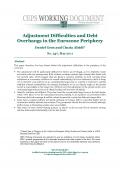Merler, S. (2015) “Who’s (still) exposed to Greece? – a first trace of normalisation and resume in confidence since 2013, which the present political turmoil risks to revert“, Bruegel Institute, 29 January. Since the start of the crisis, the structure of Greek debt has changed considerably (almost 80 percent of government financial liabilities are now accounted for by loans, against slightly less than 20 percent back in 2008). At the same …Read More
Quantitative easing in euro zone requires shared risk
Gros, D. & Kopf, C. (2015) “Quantitative easing in euro zone requires shared risk“, Centre for European Policy Studies: Economic Policy, Researchers’ work published externally, 21 January. In their column published online by Reuters, Daniel Gros and Christian Kopf offer their assessment of the programme of sovereign bond purchases to be undertaken shortly by the European Central Bank in the euro area. They examine in particular the accounting technique …Read More
Denmark should abandon its euro peg
Mitchell, B. (2015) “Denmark should abandon its euro peg, Bill Mitchell Blog, 21 January. In my soon-to-be-published book on the Eurozone I examined the case of Denmark in some detail in the context of the evolution of the European Monetary System, the European Exchange Rate Mechanism (ERM), and the ratification process of the Treaty of Maastricht. Denmark was a participant in all the attempts to maintain fixed exchange rates …Read More
Will R&D tax incentives get Europe growing again?
Gaillard, E. & Straathof, B. (2015) “Will R&D tax incentives get Europe growing again?“, VoxEU Organisation, 20 January. Tax incentives have become a common policy tool for encouraging firms to spend more on research and development – and the recession has further raised interest in the effectiveness of this policy. This column highlights a new review of the empirical evidence, which suggests that fiscal incentives for R&D only modestly …Read More
SNB decision tells us that the crisis in entering a new phase
Mitchell, B. (2015) “SNB decision tells us that the crisis in entering a new phase“, Bill Mitchell Blog, 19 January. Switzerland – home of the secret bank vaults, which house treasures stolen from people (particularly the Jewish victims) by the Nazis during WW2 and ill-gotten cash by capitalists who wish to evade scrutiny of prudential and tax authorities of their domiciled nations. Now it is the canary, which has …Read More
Friday lay day – more snake oil from Brussels
Mitchell, B. (2015) “Friday lay day – more snake oil from Brussels“, Bill Mitchell Blog, 16 January. It’s my Friday lay day blog. I am in Sri Lanka at present and will have some reports about that over the next 14 odd days. I was amazed overnight by the comments from IMF boss Lagarde who made overt political statements in an upcoming election year by claiming that David Cameron …Read More
Quantitative easing in the Eurozone: It’s possible without fiscal transfers
De Grauwe, P. & Ji, Y. (2015) “Quantitative easing in the Eurozone: It’s possible without fiscal transfers“, VoxEU Organisation, 15 January. The ECB has been struggling to implement a programme of quantitative easing (QE) that would successfully target deflation. The main difficulty is political, stemming from opposition from German institutions. Their argument against is that a government bond buying programme by the ECB would mix fiscal and monetary policy. …Read More
Reinsurance of National Unemployment Benefit Schemes
Beblavý, Μ., Gros, D. & Maselli, I. (2015) “Reinsurance of National Unemployment Benefit Schemes“, Social welfare policies, CEPS Working Documents, Centre for European Policy Studies, 08 January. This study is a contribution to the debate around the creation of an unemployment insurance scheme for the EU/euro area by proposing an alternative mechanism to the Europeanisation of national insurance schemes. The authors make the case for a reinsurance mechanism and show that …Read More
Democracy and the threat of revolution: New evidence
Aidt, S. T., Leon, G., Franck, R. & Jensen, S. P. (2015) “Democracy and the threat of revolution: New evidence“, VoxEU Organisation, 08 January. Some theories suggest that the threat of revolution plays a pivotal role in democratisation. This column provides new evidence in support of this hypothesis. The authors use democratic transitions from Europe in the 19th century, Africa at the turn at the 20th century, and the …Read More
The convergence dream 25 years on – half of the former communist countries did not converge to advanced EU countries from 1989-2014
Darvas, Ζ. (2015) “The convergence dream 25 years on – half of the former communist countries did not converge to advanced EU countries from 1989-2014“, Bruegel Institute, 06 January. The 25th anniversary of the fall of the Berlin wall was widely celebrated – rightly so. The fall of communism opened the way for democracy, personal freedoms, security, lawfulness, fairness and economic efficiency, among others. The transition also raised hopes that …Read More







